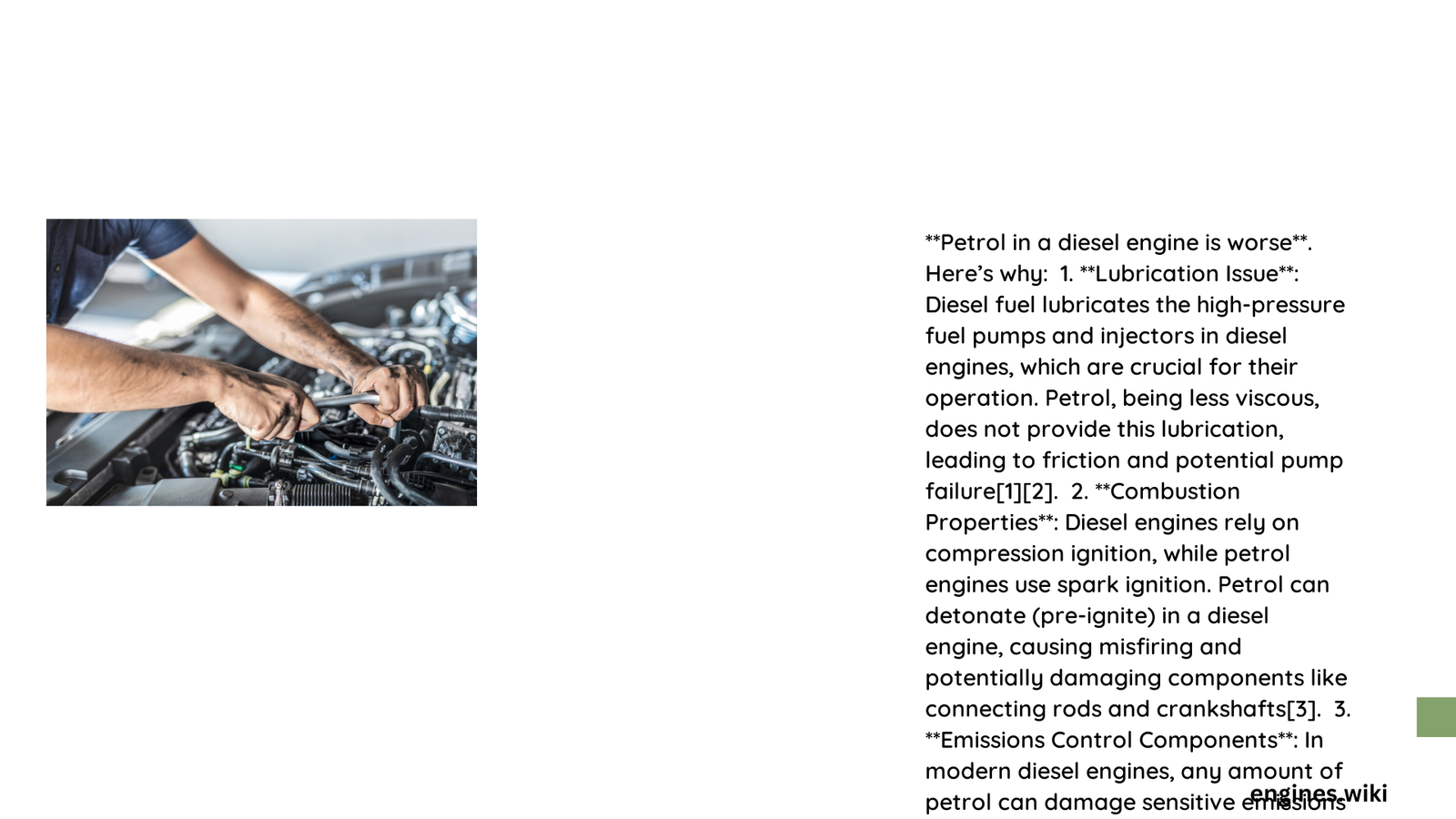Mixing fuel types in an engine can lead to catastrophic mechanical failures, but the severity varies dramatically between petrol in a diesel engine and diesel in a petrol engine. While both scenarios cause significant damage, introducing petrol to a diesel engine presents far more extensive and expensive risks, potentially resulting in complete engine destruction compared to the relatively less severe consequences of diesel in a petrol engine.\n\n## What Happens When Petrol Enters a Diesel Engine?\n\nPetrol in a diesel engine creates a perfect storm of mechanical destruction. Unlike diesel fuel, petrol lacks critical lubricating properties, causing immediate and severe mechanical stress. The consequences include:\n\n- Rapid fuel pump wear\n- Increased friction between engine components\n- Potential complete engine failure\n- Astronomical repair costs (£500 – £2,000)\n\n### Why Is Petrol More Destructive in a Diesel Engine?\n\n1. Lubrication Breakdown\n – Diesel fuel acts as a lubricant for fuel system components\n – Petrol removes this crucial lubrication\n – Causes accelerated wear on precision parts\n\n2. Combustion Incompatibility\n – Different compression and ignition characteristics\n – Premature ignition risks\n – Higher potential for mechanical damage\n\n## What Occurs When Diesel Enters a Petrol Engine?\n\nDiesel in a petrol engine creates different but less catastrophic problems:\n\n- Clogged fuel injectors\n- Potential spark plug damage\n- Engine performance reduction\n- Moderate repair costs (£300 – £1,500)\n\n### Comparative Damage Analysis\n\n| Fuel Mismatch | Potential Damage | Repair Cost Range | Severity |\n|————–|—————–|——————|———-|\n| Petrol in Diesel | High | £500 – £2,000 | Extreme |\n| Diesel in Petrol | Moderate | £300 – £1,500 | Significant |\n\n## Key Factors Influencing Damage Severity\n\n- Quantity of incorrect fuel introduced\n- Engine design and tolerance\n- Immediate detection and intervention\n- Professional repair quality\n\n### Prevention Strategies\n\n- Double-check fuel type before filling\n- Use fuel type markers in vehicle\n- Educate drivers about fuel system risks\n- Consider comprehensive vehicle insurance\n\n## Technical Insights\n\nThe molecular structure of petrol and diesel fundamentally differs, creating unique challenges when mixed incorrectly. Diesel engines operate at higher compression ratios and rely on compression-ignition, while petrol engines use spark-ignition mechanisms.\n\n### Immediate Actions\n\n1. Do not start the engine\n2. Contact professional mechanics\n3. Arrange for complete fuel system drainage\n4. Conduct comprehensive system inspection\n\n## Cost Implications\n\nRepair costs can escalate quickly, making prevention crucial. Professional intervention is mandatory to mitigate long-term engine damage and potential total vehicle write-off.\n\n### Expert Recommendation\n\nAlways prioritize fuel system integrity over temporary convenience. The cost of incorrect fuel introduction far exceeds preventative measures.\n\n## Conclusion\n\nWhile both fuel mismatches cause significant problems, petrol in a diesel engine represents a more severe and potentially terminal mechanical risk. Prevention, awareness, and immediate professional intervention remain the best strategies.\n\n### References:\n- CarExamer Fuel Mismatch Guide\n- Check This Car Fuel Comparison\n- Motorway Fuel Mismatch Insights

